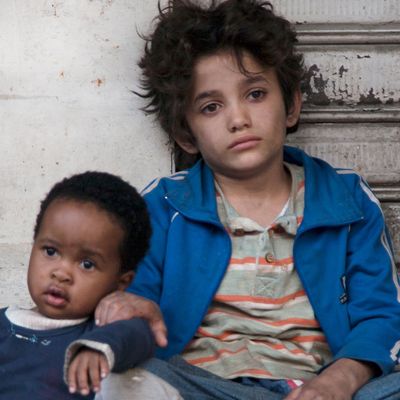
This review originally ran during the Cannes Film Festival.
Nadine Labaki’s Capernaum never mentions abortion by name, but it’s one of the most forcefully pro-choice films I’ve ever seen. It starts with the audacious, hooky premise of a young boy who sues his parents for having him, and over the course of its two hours, it makes its case relentlessly, devastatingly, and uncompromisingly. Movies almost inherently celebrate life — life-giving, the moments of vitality in otherwise difficult situations. In following her young protagonist and his infant sidekick, Labaki does none of that, only articulating the impossibility of the lives that were bestowed upon them. It’s a deeply assured piece of direction, and though it only plays a few emotional notes, they are ones that won’t soon leave your memory.
The film takes place in Beirut, but the title takes its name from the ancient Israeli fishing town of Capernaum, which in turn became the namesake for a word meaning “disorderly accumulation of objects.” In the slums that Labaki’s characters inhabit, people, especially children, come to be a part of that disorderly accumulation as well. When the film opens, Zain (Zain Alrafeea), who guesses he’s 12 but whose stunted body looks much younger, is being taken out of prison to face his parents in court. He has a lawyer, and even though he’s already stood trial for a stabbing (the details of which we’ll come to learn) he is now the plaintiff: He is here to make the case that his very birth was a crime of neglect.
Alrafeea is a startling, unforgettable presence, and his preternaturally soulful, unsmiling face is our guide through the chaos of Zain’s life. From the courtroom, we flash back to the series of unfortunate events that landed Zain in prison, starting with the brutal heartbreak of seeing his 11-year-old sister Sahar (Cedra Izam) sold off to be the bride of a grown man for a few chickens. It’s a devastating sequence, and 15 minutes into the film, you’re already agitated enough to wish for a life sentence for Zain’s parents. Their home is hellish and chaotic, they earn their living smuggling drugs into the local prison, and the only thing keeping their youngest infant from getting into their cooking supplies is a length of chain cuffed to her ankle. Image after image of squalor and dysfunction fill the frame, and when Zain escapes, full of rage and sadness at the loss of Sahar, it’s hard to think of a better course of action.
Perhaps that’s what’s missing from Labaki’s film: It gives us course after course of heart-wrenching scenarios and is so tied to the POV of its child protagonist that it’s hard to get a sense of any course of action than the one chosen. Zain soon meets an Ethiopian immigrant named Rahil (Yordanos Shifera, a shining, openhearted screen presence) and her infant son Yonas, both of them undocumented. She takes Zain in and feeds him, and he looks after the baby while she goes to work. Rahil’s tender mothering of Yonas — played by tiny Treasure Bankole, the most strikingly emotive and talented toddler I’ve ever seen onscreen — is a balm after the hostility of Zain’s home. But her situation is heartbreaking in its own way: Rahil smuggles Yonas along with her to work in a shopping cart before Zain comes along to be the nanny. She needs to get new papers forged, but she doesn’t have the money, and one day while out trying to find the money, she never comes home.
Zain and Yonas’s situation in Rahil’s absence goes from dire to almost unwatchable. There’s no doubt at all that Labaki is a filmmaker of extreme empathy, with a real intuition for how to capture the dynamics between children in particular. Capernaum sometimes feels at risk of buckling under the weight of its own suffering, yet somehow Zain’s heavy-handed Spartacus moment feels unearned. You want some measure of peace for these characters, but Labaki also wants to make them emblems, which feels unnecessarily manipulative. She’s done so much, after all: pulled impossible-feeling performances from her young leads, and turned Beirut’s slums into a kind of unrelenting, absolutely memorable choral dysfunction. It’s not as if we’re not crying our eyes out already.
Capernaum was nominated for a 2019 Oscar in Best Foreign Language Film.

